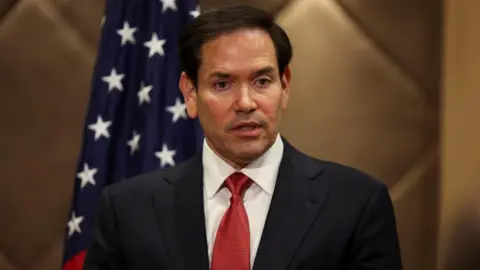In a recent declaration, Marco Rubio, the prominent American diplomat, expressed skepticism about the upcoming peace talks between Ukraine and Russia. These talks are scheduled to take place in Turkey, and Rubio emphasized that significant progress is unlikely unless former President Donald Trump and Russian President Vladimir Putin meet directly. This assertion arose following a meeting of NATO foreign ministers held in southern Turkey, where discussions surrounding the ongoing Ukraine-Russia conflict occupied a central role in dialogues.
Rubio’s comments highlight a critical perspective that direct engagement between influential leaders may be a prerequisite for any breakthrough in negotiations. He articulated, “I don’t think we’re going to have a breakthrough here until President Trump and President Putin interact directly on this topic.” His apprehension reflects a broader sentiment that diplomacy, particularly in complex geopolitical issues, often requires interactions among key decision-makers at the highest levels.
Ukrainian President Volodymyr Zelensky also confirmed the nation’s participation in the forthcoming discussions, indicating that Ukraine would send a delegation to Istanbul. However, Zelensky did voice his critique regarding the “low-level” nature of the Russian delegation that was dispatched. The Russian team, headed by presidential aide Vladimir Medinsky, reassured that they possessed “all the necessary competencies” to engage effectively in the talks, despite the perceived inadequacy noted by Ukraine.
As the day progressed, Trump, while on a visit to the Middle East, echoed similar sentiments regarding the need for face-to-face discussions with Putin to facilitate meaningful dialogue. When questioned about his expectations from the Russian delegation during a flight on Air Force One, Trump remarked, “Look, nothing’s going to happen until Putin and I get together.” He underscored the necessity of resolving the ongoing conflict, stating, “But we’re going to have to get it solved because too many people are dying.” Although he mentioned a possible appearance at the talks in Turkey if appropriate, he later indicated that he would likely return to Washington.
The historical backdrop of these discussions is significant, as they mark the first direct negotiations between Ukraine and Russia since the collapse of talks in 2022 when Russia initiated a full-scale invasion. Negotiations back then had ended without substantial progress, and Russia appears intent on reviving discussions from that juncture. The planned discussions in Istanbul were set to include delegations from not only Ukraine and Russia but also Turkey and the US.
Previous peace efforts, as noted by Medinsky, had sought to address various fundamental issues, like Ukraine adopting a neutral status and limiting its military ambitions. However, these conditions were firmly rejected by Ukraine, which views them as tantamount to capitulation. The ongoing clashes in Ukraine reveal a grim reality, with reports detailing that Russia gained control over two additional villages in the eastern Donetsk region recently, thereby maintaining control over approximately 20% of Ukraine’s territory, which includes the illegally annexed Crimea peninsula.
UK Defence Minister John Healey emphasized the need for Ukraine’s allies to escalate pressure on Putin, advocating for further sanctions to compel him back to the negotiation table. His remarks followed meetings with Germany’s defence chief, highlighting the collaborative efforts among Western nations to influence the outcome in Ukraine positively.
In an era where diplomacy often prevails over conflict resolution, the nuanced interactions among world leaders in Turkey could determine the future trajectory of the Russia-Ukraine relationship. Zelensky’s continued call for a high-level meeting with Putin accentuates the criticality of personal diplomacy in resolving this enduring conflict. As all parties converge in Istanbul, the global community remains watchfully poised for any potential opening that could lead to peace and stability in the region.



